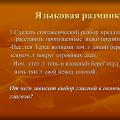Vasily Trediakovsky works. Trediakovsky, Vasily Kirillovich – short biography
Vasily Trediakovsky is a man with a tragic fate. As fate would have it, two nuggets lived in Russia at the same time - Lomonosov and Trediakovsky, but one will be treated kindly and remain in the memory of posterity, and the second will die in poverty, forgotten by everyone.
From student to philologist
In 1703, on March 5, Vasily Trediakovsky was born. He grew up in Astrakhan in a poor family of a clergyman. A 19-year-old young man went to Moscow on foot to continue his studies at the Slavic-Greek-Latin Academy.
But he stayed there for a short time (2 years) and, without regret, left to replenish his knowledge in Holland, and then to France - to the Sorbonne, where, enduring poverty and hunger, he studied for 3 years.
Here he participated in public debates, mastered mathematical and philosophical sciences, was a student of theology, and studied French and Italian abroad. He returned to his homeland as a philologist and an atheist.
The rise of a career and the indignation of the clergy
Since 1730, he was the court poet of Anna Ioannovna, his duties included “cleansing” the Russian language, as well as composing ceremonial speeches; later he would become a translator at the Academy of Sciences. Trediakovsky was the first to introduce secular novels into literature.
The clergy will almost accuse him of atheism when he translates Talman’s novel “Riding to the Island of Love” into “colloquial” Russian, since all official literature was written in Old Church Slavonic.
Innovative ideas
On May 14, 1735, Russian poetry received new breath and development. The scientist made a proposal to reform literature and proposed a new versification. In addition, he believed that it was necessary to compile a grammar of the Russian language, dictionaries and rhetoric.
His innovative theoretical ideas were brought to life by Lomonosov; it was he who published “Grammar” and “Rhetoric”. The poet first used the word “ode” in Russian.
He was a pioneer in the composition of praiseworthy odes. From his pen they came out 5 years before the appearance of Lomonosov’s famous creations. In the preface to them he will write the theory “Discourse on Odes in General,” where he will define this genre.
Trediakovsky - poet
Trediakovsky's poems are diverse both in style and genre. One of his best works is “Poems of Praise for Russia,” imbued with patriotism and love for his country.
It is worth noting his significant work “Epistola from Russian Poetry to Apolline,” where he examined all world literature, starting with Homer and Ovid, ending with Spanish and German authors.
Trediakovsky scientist-philologist
Despite his poetic diversity, Trediakovsky the theorist did much more and more significantly. His translations had great educational significance.
A huge work of multi-volume translation of the history of Rome and Greece became the first “textbook” for the Russian reader. Trediakovsky was ridiculed by his contemporaries and was considered mediocrity.
In recent years he lived in poverty and died completely alone in August 1769, in St. Petersburg. And only thanks to A.S. Pushkin, who appreciated his work, critics and scientists reconsidered their views and appreciated Trediakovsky’s merits.
In 1735 Trediakovsky published a treatise. In this work he outlined the system of literary genres of classicism and gave the first examples of sonnet, rondo, madrigal, and ode in Russian poetry. In addition, the poet laid the foundation for the reform of Russian versification, pointing out that the method of composing poetry depends on the natural properties of the language. Since in Russian verse the stress is not assigned to a specific syllable, the syllabic, suitable for a language with constant stress, is not suitable for Russian versification. He cited folk poetry as an example. However, Trediakovsky imposed a number of restrictions on the syllabic-tonic system, which were opposed by Mikhail Lomonosov in his Letter on the Rules of Russian Poetry.
Vasily Trediakovsky owns several more literary and theoretical treatises: “Discourse on Odes in General,” , , in which the techniques of classicism were developed. These works were based on the principles of Nikola Boileau’s book “Poetic Art,” which Trediakovsky translated in 1752. One of the most famous odes by Trediakovsky was an imitation of Boileau. In an effort to provide examples of various poetic genres, he wrote the philosophical poem “Theoptia” and a poetic adaptation of the “Psalter”. He also translated the political-allegorical Latin novel by the Scottish writer George Barclay, Argenida.
August 17, 1768
Works of Vasily Trediakovsky
“A new and concise way to compose Russian poetry with the definition of previously relevant knowledge”
"Discourse on ode in general"
“Prediction of the Iroic Pyima”
"Discourse on Comedy in General"
“Solemn Ode on the surrender of the city of Gdansk”
"Theoptia"
"Psalms"
"Argenida"
"Tilemakhida"
Family of Vasily Trediakovsky
17.08.1768
Russian Writer
Vasily Trediakovsky was born on March 5, 1703 in the city of Astrakhan. The boy grew up in the family of a priest. As a child, he was sent to a school of Catholic Capuchin monks, where instruction was conducted in Latin. In 1723 he fled from Astrakhan to Moscow, where he entered the Moscow Slavic-Greek-Latin Academy. However, the teaching there did not satisfy the young man and in 1727 he left for Holland, from where he went on foot to Paris. In Paris he studied mathematical, philosophical and theological sciences at the Sorbonne. In 1730 he returned to St. Petersburg.
The first significant work published by Trediakovsky upon his return to Russia was a translation of Paul Talman’s novel “Riding to the Island of Love.” In addition to the translation, the book presents original poems by Vasily Kirillovich in Russian, French and Latin. The poet was very sensitive to the public's reaction to his book, which on the whole turned out to be friendly, although some bigots from among the clergy called him a corrupter of Russian youth. Trediakovsky was introduced to Empress Anna Ioannovna, who awarded him the title of court poet, translator, and then academician of the Russian Academy of Sciences.
However, the poet's everyday success was short-lived. In 1735, Trediakovsky was accused of dropping her highest title with his song on the occasion of the empress’s coronation. In 1740, the poet experienced a deep shock. Minister Artemy Volynsky demanded that the poet write poems for a clownish wedding in the Ice House. Dissatisfied with Vasily Kirillovich's reaction to this order, the diplomat beat him and ordered him to be flogged. In addition, the clergy accused the poet of atheism. After all these events, Trediakovsky’s dream was peace and solitude, in which he could work calmly.
Later, Trediakovsky published one of his most famous works: a poetic translation from the French novel “The Adventures of Telemachus” by Francois Fenelon, called “Tilemakhida”. The prose is translated in hexameter. In addition, I introduced my own introduction into the text and significantly revised the author’s style. The publication of Tilemakhida occurred shortly after the accession of Catherine II, who saw hints of her own reign in the poem, and Tilemakhida became the subject of ridicule and mockery. According to contemporaries, the punishment at court was established: for minor guilt, drink a glass of cold water and read a page from Tilemakhida, and for greater offenses, learn six lines from the poem.
Trediakovsky’s hard work turned out to be amazing. His poetic works amount to tens of thousands of lines, translations into dozens of volumes. He devoted more than twenty years to translating Ancient History and Roman History of Charles Rollin, whose lectures he attended at the Sorbonne. Vasily Kirillovich also translated “The History of the Roman Emperors” by Jean-Baptiste Crevier. Rollin's stories were published by Trediakovsky with extensive Pre-Notices from the person who worked in translation, in which he outlined his translation principles, many of which are not disputed by modern translation theory.
In 1759, Trediakovsky was fired from the Academy of Sciences. In 1768, he was overtaken by a serious illness: his legs were paralyzed. Despite this, the poet continued to work on translations and his own works.
Vasily Kirillovich Trediakovsky died August 17, 1768 in St. Petersburg. The great poet was buried at the Smolensk cemetery. The burial has been lost.
Works of Vasily Trediakovsky
“A new and concise way to compose Russian poetry with the definition of previously relevant knowledge”
"Discourse on ode in general"
“Prediction of the Iroic Pyima”
"Discourse on Comedy in General"
“Solemn Ode on the surrender of the city of Gdansk”
"Theoptia"
"Psalms"
"Argenida"
"Tilemakhida"
Family of Vasily Trediakovsky
Wife - Fedosya Fadeeva, daughter of the guard of the provincial chancellery.
Son - Lev Vasilyevich Tredyakovsky.
However, his creative legacy was not appreciated by his contemporaries. Only later, already in the 19th century, did his translations and original works gain recognition. The reason for such belated success is that the author’s contemporaries sought to create an easy literary language, while the poet was a supporter of complex versification, focusing on the best examples of antiquity and imitating them.
Childhood and youth
Vasily Trediakovsky was born in 1703 into the family of an Astrakhan priest. He graduated from the Latin school, which was founded at the Catholic mission in the city. As a child, he sang in the church choir. He carried his passion for music throughout his life, later even starting to compose his own compositions. Little information about his youth has been preserved, only a notebook with a quatrain remains, which testifies to the boy’s early passion for poetry.
The future poet was initially going to enter the Kiev-Mohyla Academy, but for unknown reasons he did not go there, but instead went to Moscow. From 1723 to 1725, Vasily Trediakovsky studied at the Slavic-Greek-Latin Academy at his own expense. At this time, he took up literature seriously: he wrote his own novel and translated some works from Latin. After two years of study, he had the opportunity to go abroad, so he left the academy.

Traveling around Europe
Vasily Trediakovsky lived in The Hague for some time, but soon left this country and moved to Paris, where he settled with the head of the Russian diplomatic mission. In general, very little is known about the poet’s stay in European countries, however, the surviving news suggests that he received a good education in However, he was never able to pass the bachelor’s exams, since they were paid, and the poet had no money .
Nevertheless, this stage was important in his work, since he became acquainted with French culture and enlightenment, which had a great influence on him, although, of course, in just two years he could not fully penetrate the ideas of European ideology that were new to him. From 1729 to 1730 the poet lived in Hamburg. Vasily Trediakovsky, whose work by that time had already taken shape as pro-European, met local intellectuals, studied music and wrote some poems. In addition, he was a member of the circle of Russian diplomats, communication with whom increased his cultural level.

First success
Returning to his homeland, the poet was assigned to the Academy of Sciences as a student, which was a great success, since it opened up great opportunities for him in the scientific world. In 1730 he published his translation of the French novel Ride to the Island of Love. This became a real event in cultural life. This romantic, courtly work immediately gained great popularity among the reading public. After the publication of this work, Vasily Trediakovsky remained the most popular author. The poet accompanied his work with a collection of poems of his own composition.

Versification reform
In the 1730s, the poet began changing the Russian literary language. Trediakovsky sought to separate prose and poetry and considered Latin versification as the standard of the latter, to which he tried to adapt Russian poetry. However, he immediately began to be criticized for the complex construction of sentences, unclear meaning, and confusing grammatical construction. The poet often resorted to inversion and actively used interjections, which, in the opinion of literary scholars of that time, complicated and spoiled the lyrics.
Meaning
Vasily Trediakovsky, whose brief biography is the subject of this review, left a noticeable mark on His experiments, scientific research in the field of literature, disputes with Lomonosov and Sumarokov contributed to the emergence of domestic criticism and original works in various genres. He also made a great contribution as a translator. Thus, thanks to him, the Russian reader became acquainted with the works of the French scientist on ancient history. Towards the end of his life his health deteriorated and he died in 1769.
Trediakovsky Vasily Kirillovich was born on February 22 (March 5 n.s.) in Astrakhan in the family of a priest. At the insistence of his father, he studied at the school of Catholic Capuchin monks, then served in the church. In the early 1720s, leaving church service, he fled to Moscow, where from 1723 to 26 he studied at the Slavic-Greek-Latin Academy.
In 1726 he went to Holland, lived in The Hague with the Russian ambassador, then, reaching Paris on foot, studied at the Sorbonne in 1727 - 30.
In 1730 he returned to Russia, where he began active literary work: he published a translation of P. Talman’s novel “Riding to the Island of Love” with the appendix of his love poems. Written in the most “simple” syllable, they created Trediakovsky’s popularity.
From 1732 he became a translator at the Academy of Sciences. In 1735 he gave a speech at the Academy on the need for reform in Russian versification; later he wrote a treatise on this topic, “A New and Brief Method for Composing Russian Poems.” It outlined a new system of verse - syllabic-tonic, based on the regular alternation of stressed and unstressed syllables - a system of poetic genres of classicism, examples of the sonnet, rondo, madrigal, and ode were given. This reform determined the further development of Russian poetry.
In 1752, a two-volume collection “Works and Translations in both Poetry and Prose” was published, where he outlined his views on the theory of poetic translation. At this time, Trediakovsky's position in literature and the Academy became increasingly difficult (in literary disputes with Lomonosov and Sumarokov, Trediakovsky's views on versification and the structure of the literary language did not receive recognition and support from new generations of writers). Due to condemnation by the Synod for “doubtfulness,” the most significant poetic works—the philosophical poem “Theoptia” and the complete poetic transcription of the “Psalter”—remained in manuscript.
Attacks on Trediakovsky intensified after the publication of his study “On Ancient, Middle and New Russian Poems,” which gave preference to syllabic poetry over modern poetry.
In 1759 he was dismissed from the Academy, but continued his literary work: he completed translations of historical works. A fair assessment of Trediakovsky’s activities was given only later by A. Radishchev and A. Pushkin. Died in St. Petersburg on August 6 (17 n.s.) 1768.
Best of the day
| Naturalist Visited:68 |
Maria Kurdenevich |
The starting point for all further development of Russian literature is the assimilation of the rules of French classicism by four people born under Peter, and their efforts to transfer these rules and norms to Russian literary soil. These four people are Kantemir, Trediakovsky, Lomonosov and Sumarokov.
Trediakovsky and Lomonosov. Lecture by A. N. Uzhankov
Vasily Kirillovich Trediakovsky (1703–1768) was the son of a poor Astrakhan priest. They say that Peter the Great, passing through Astrakhan, saw little Trediakovsky and, stroking his head, called him “an eternal worker” - a prophecy that determined his whole life.
Trediakovsky was the first non-nobleman to receive an education abroad, moreover, at the very source of European culture - in Paris. He studied French perfectly and even learned to write in it. poetry fugitives(light poetry), which were not below the then accepted level. Upon returning to Russia in 1730, he was appointed secretary of the Academy. One of his duties in this post was the composition of laudatory odes and panegyrics for various occasions and solemn speeches in Russian and Latin.
Vasily Kirillovich Trediakovsky
There are countless anecdotes about how he failed to maintain his dignity in relations with the arrogant nobles of the time, who saw in a professional poet and speaker something of a domestic servant of the lowest class. His prose translations are unusually clumsy. The poems are devoid of poetic merit and became completely unreadable long before his death. His main work - a translation in hexameters of Fenelon's Telemachus (1766) - became, as soon as it appeared, the personification of everything pedantic and ugly. Trediakovsky went down in history as a despised and ridiculous figure.
The tireless diligence of the “eternal worker” inspires some respect. But Trediakovsky’s right to be recognized as an outstanding figure in the history of Russian literature lies not in the poems he wrote, but in his works on the theory of poetry and versification. His Opinion about the beginning of poetry and poetry in general(1752) is the first presentation in Russia of the classical theory of imitation. Even more important are his works on Russian versification. Although the legend that he was allegedly the first to introduce the correct foot into Russian verse does not correspond to reality, Trediakovsky’s theoretical views are not only remarkable for his time, but are also interesting today.
 Groshev Nikolay - book series - stalker books - ebook - our swag - bar reactor
Groshev Nikolay - book series - stalker books - ebook - our swag - bar reactor Verb conjugation Features of verb conjugation in Russian
Verb conjugation Features of verb conjugation in Russian The cities of Hellas are subject to Macedonia Outline of the Peloponnesian War download the Belarusian edition
The cities of Hellas are subject to Macedonia Outline of the Peloponnesian War download the Belarusian edition